The Special Press Conference of Xinjiang Uygur Autonomous Region on Refuting the Allegation of “Forced Labor”
(December 15, 2021)
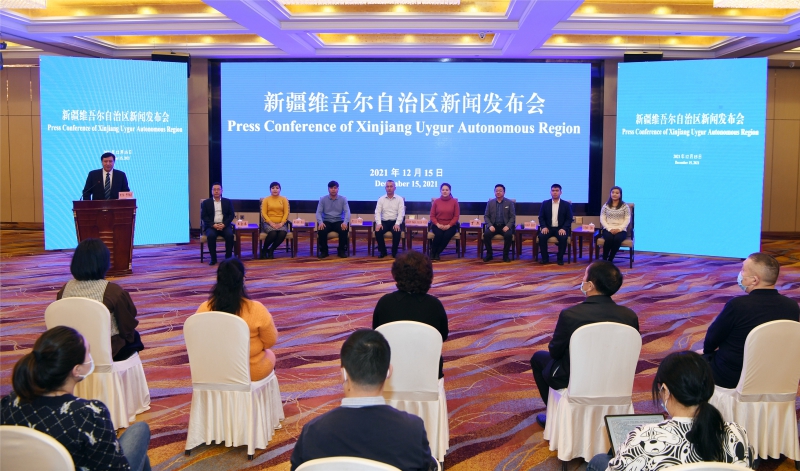
Photo taken on December 15, 2021 shows the special press conference of Xinjiang Uygur Autonomous Region on refuting the allegation of “forced labor”. Photo by Xinjiang Daily/ Zhou Peng
On December 15, 2021, the special press conference of Xinjiang Uygur Autonomous Region on refuting the allegation of “forced labor” was held in Urumqi. Representatives from all walks of life were invited to attend the conference, including one university professor and eight representatives from different localities of Xinjiang. They vigorously refuted the so-called “forced labor” fallacy concocted by anti-China forces in the United States and the West through the revelation of the human rights conditions in the U.S. and the stories of the ethnic minorities’ about the happy life created from hard work in Xinjiang.
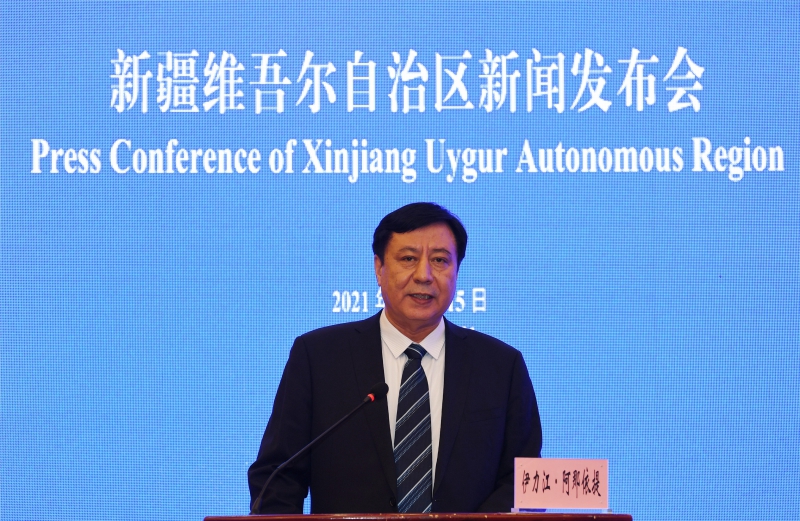
Photo taken on December 15, 2021 shows Elijan Anayat, spokesman of People’s Government of Xinjiang Uygur Autonomous Region, presided over the special press conference of Xinjiang Uygur Autonomous Region on refuting the allegation of “forced labor”. Photo by Xinjiang Daily/ Zhou Peng
Elijan Anayat: Good morning, fellow media friends. Welcome to attend today’s press conference held by Xinjiang Uygur Autonomous Region. I’m the spokesperson of the Government of Xinjiang Uygur Autonomous Region, Elijan Anayat.
First of all, please allow me to introduce the participants of today’s conference. They are: Peng Wuqing, professor at the School of Political Science and Law of Xinjiang Normal University; Alimujiang Maitusong, Head of the Rose Cooperative, Yutian County, Hotan Prefecture; Maimaitili Mutila, Head of Xinjiang Su’antong Road Maintenance Company, Artux City, Kizilsu Kirghiz Autonomous Prefecture; Wang Jintai, a farm technician from Changji National Agricultural Science and Technology Park; Qimanguli Keyimu, a textile worker from Gaochang District, Turpan City; Reziwangu Simayi, Deputy Secretary of the Party Branch of Aqidun Village, Yangtake Township, Maigaiti County, Kashgar Prefecture; Buqiguli Yasen, a rural factory employee from Zhanmin Township, Shufu County, Kashgar Prefecture; Tuohetawubai Xiayimu’erdan, the Imam of Minzhu North Road Mosque, Qinghe County, Altay Prefecture; Ding Jie, Vice president of Fellowship Association for the New Social Stratum and General Manager of Xinjiang Hualian Construction Investment Group Limited Company.
I’m going to make some comments regarding the “forced labor” fallacy related to Xinjiang fabricated by anti-China forces in the U.S. and the West.
Recently, western anti-China forces led by the U.S. published their fallacies related to Xinjiang, claiming that “oppression and forced labor against Uygurs are implemented in Xinjiang”. In this regard, we must express our strong condemnation and firm opposition.
Americans never get tired of talking about “international rules” and “human rights first”. But in fact, they are the ones in contempt of international rules and in violation of labor rights. They have absolutely no right to be the “human rights instructor” to anyone. The U.S. is much criticized for the absence of labor rights and interests protection. According to the reports of International Trade Union Organization, systematic violation of labor rights exist in the U.S. with the most severity among main developed countries. The reports issued by the International Trade Union Organization on June 10, 2015 listed the U.S. one of the countries systematically violating labor’s rights and interests. In May 2018, the special rapporteur of the United Nations Extreme Poverty and Human Rights Issues published a report, pointing out that deficiencies existed in the U.S. social security system-one fourth of full-time employees and three fourths of part-time workers do not enjoy paid sick leave. In June 2021, the labor issues of the U.S. were extensively criticized at the International Labor Conference.
People of all ethnic groups enjoy absolute freedom in employment. Government of Xinjiang adheres to the employment policy of self-employment, market regulation, government assistance and entrepreneurship encouragement. The role of market allocation of labor resources has taken active effect. Workers of all ethnic groups construct labor relations with enterprises voluntarily in a mutual selection way. People of all ethnic groups in Xinjiang have the full freedom in choosing vocations, working places and posts. Their personal freedom has never been under any form of restriction. The government’s job is to build a sound working environment for them, create the most favorable conditions for people to land a satisfactory job and earn a stable income and protect the working rights for people of all ethnic groups to the most.
Elijan Anayat: First of all, let’s welcome Professor Peng Wuqing from the School of Political Science and Law of Xinjiang Normal University to give us relevant information.
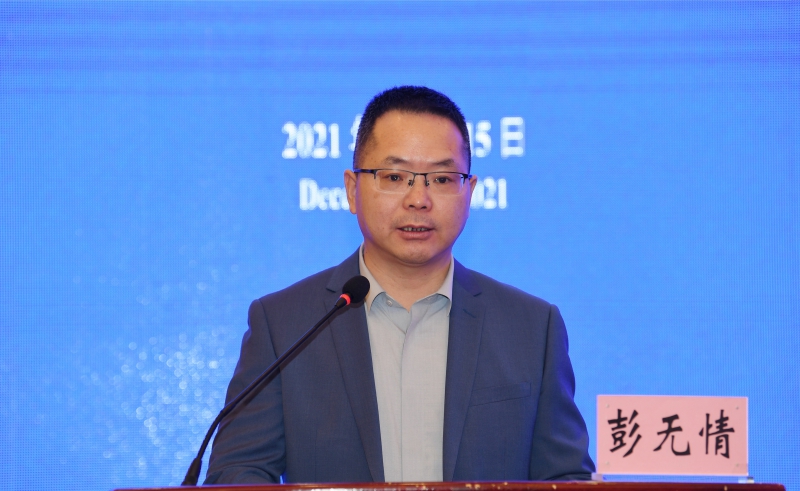
Photo taken on December 15, 2021 shows Peng Wuqing speaks at the special press conference of Xinjiang Uygur Autonomous Region on refuting the allegation of “forced labor”. Photo by Xinjiang Daily/ Zhou Peng
Peng Wuqing: Recently, some politicians in the U.S. made public speeches lying that “Uygurs in Xinjiang are experiencing oppression and forced labor”. This is a big fat lie. Their purpose is to practice long-arm jurisdiction, implement export controls under the excuse with the attempt to suppress enterprises in Xinjiang and create “forced unemployment” and “forced poverty” so that people of all ethnic groups will be trapped in the mire of poverty, isolation and backwardness. However, the irony is that these politicians seem to have forgotten that the United States of America is the country where forced labor does exist while they are busy with smearing Xinjiang.
As a matter of fact, the U.S. has a history of hundreds of years trafficking, abusing and discriminating black slaves. From the first group of slaves arriving at the continent in 1619 to the abolish of slaves system in 1865, the southern plantations on the Continent of America were the main avenues of forced labor against minority people including African Americans.To ensure adequate labor, U.S. traders continued to ship some 170,000 slaves to the United States through various means, a third of the total number of North American slave imports since 1619, even during the 1783-1808 ban on international slave trade. According to statistics, the labor value squeezed by American slave owners from slaves is as high as USD 14 trillion at present price. It can be said that forced labor is an irremovable stain in America’s development history.
Even in the 21st century when laws are universally established, forced labor-the scourge of slave society is still deep-rooted in the U.S. only with the victims changed from black slaves to minorities. In the past five years, all 50 states in the United States and the Washington D.C. and the District of Columbia have all reported cases of forced labor and human trafficking. Every year, as many as 100,000 people are trafficked to the U.S. as forced labor from abroad, half of whom are trafficked to sweatshops or subjected to family slavery. In 2019 alone, the FBI reported 1883 cases of human trafficking, an increase of over 500 cases compared with 2018. According to the statistics of certain American academic institutions, at least half a million people in the United States are subjected to modern slavery and forced labor. Recently, the Associated Press reported that hundreds of Indian workers were recruited to build a large Hindu temple in New Jersey. Passports of these workers were taken away right after they disembarked and forced to work more than 87 hours a week. The local minimum wage in New Jersey is USD 12 per hour, while the wages of these Indian workers are only USD 1.2 per hour.
Agriculture is also a worse-hit field of forced labor. Farm Workers Justice organization claimed in the report No Way to Treat A Guest that U.S. farmland owners do not have to pay seasonal migrant workers’ social security and unemployment insurance although the labor costs are very low. They are also accused of malicious wage deductions, debt servitude, racial discrimination, lack of guarantees of basic accommodation and working safety. In agriculture, 30% of farm workers and their families live below the federal poverty line. They have trouble in expressing their demands as they are threatened or treated violently and forced to work. Most farm workers are male migrants, many of whom are not registered and may get deported at any time. Because they do not speak English, know nothing about labor rights, and are afraid of being deported, they can only choose to swallow up the unfair treatment in the face of employer’s exploitation.
The prison and detention systems of the U.S. are hidden places of forced labor as well. The U.S. has the largest prison system in terms of scale globally, imprisoning about 2.3 million convicts. Although the 13th Amendment to the Constitution of the U.S. abolished slavery in 1865, it permitted prisons to force prisoners to work at the same time. There is absolute evidence that American prisoners are forced to work with strikingly low wages, USD 0.86 to USD 3.45 a day on average. In some states, they do not even get any remuneration. The website of the Black Agenda Report in the United States shows that American prisoners are not protected by law and have no right to refuse forced labor. They may be forced to participate in some dangerous work, such as extinguishing California wildfires with as much as USD 5.12 a day. Prisoners in California’s women’s prisons are forced to produce masks at risk of infection after the outbreak of COVID-19 in the United States in 2020. They work 12 hours a day on 8 cents to 1 dollar an hour, the Los Angeles Times reported. Of the tens of thousands of masks they produce everyday, none of the masks belong to them.
The U.S. is also notorious for the abuse of child labor. The United States is the only country in the world that has not ratified the United Nations Convention on the Rights of the Child. According to some industry associations in the United States, about half a million child workers in the United States work in agriculture. Many children start working at the age of eight, 72 hours a week, more than 10 hours a day. Child workers are three times more likely to be carcinogenic caused by pesticides than adults. According to official statistics from the U.S., law enforcement officials in the U.S. found 858 cases of child labor in violation of the Fair Labor Standards Act and 544 minors working in hazardous workplaces in 2019. Another concerning aspect is the widespread employment of child labor in the United States tobacco industry. According to some human rights organizations, many states in the United States employ a large number of children in tobacco farms to harvest and dry tobacco leaves, and even operate heavy machinery. At the same time, tobacco farms pose great harm to children’s physical and mental health. It is reported that children working in tobacco farms generally have symptoms of nausea and headache, nicotine poisoning, or even lung infection.
Violations of labor rights occur not only in the United States, some American companies have extend the evil claws to other countries. According to Reuters, one of the world’s largest tire manufacturers-the U.S. Goodyear Tire and Rubber Corporate, has recently been charged with a number of indictments.
Numerous facts and cases have proved that forced labor in the U.S. is both the history of blood and tears of black slaves and the nightmare for modern migrants to the U.S.. But the U.S. government chooses to neglect the problem and deliberately shirk from its due responsibilities. According to the statistics from the International Labor Organization, the United States has ratified only 14 international labor conventions so far; among the eight ILO core conventions, the U.S. has ratified only two, making it one of the countries with least ratifications. However, this coincides with the long-term bad record of forced labor and labor rights violations in the country. No matter how hard the U.S. and other western anti-China forces smear Xinjiang on the labor issue and how much they like to self-claim as “democratic lighthouses” and “human rights defenders”, the hard evidence of their violation of labor rights will never be covered.
Elijan Anayat: Thanks very much, Professor Peng. Next, let’s welcome Alimujiang Maitusong, Head of the Rose Cooperative, Yutian County, Hotan Prefecture, to give us relevant information.
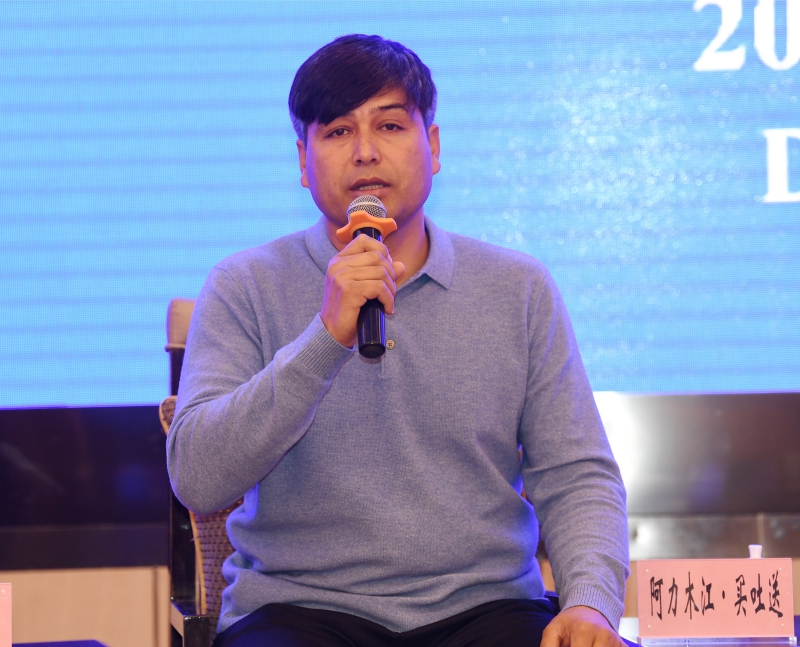
Photo taken on December 15, 2021 shows Alimujiang Maitusong speaks at the special press conference of Xinjiang Uygur Autonomous Region on refuting the allegation of “forced labor”. Photo by Xinjiang Daily/ Zhou Peng
Alimujiang Maitusong: Good morning, everyone. My name is Alimujiang Maitusong, a native of Yutian County and also the head of a rose cooperative. I have a family of four, the first-born son at college now and the younger one at primary school.
When I was searching the Internet recently, some report caught my attention saying that “ Uygurs in Xinjiang are being forced to work”, which made me wonder “where do these speeches come from?” I’m the head of a cooperative which employs a few dozens employees. I have never seen nor heard of the things depicted by anti-China forces in the U.S. and the West. Their actions are absolute slander.
In 2015, many villagers started to plant roses in hope of making money. It was then I had the idea of establishing a rose cooperative to turn roses into products to make more money. It required a large sum of money to start a cooperative. I didn’t have all the needed money, so I decided to discuss it with the major rose planters in our village. To my surprise, we were planning the same thing. That’s how the rose cooperative got started.
Through years’ development, our cooperative now have more than 500 square meters of standardized production workshops, four drying rooms and one office building. Each year, 200-300 tons of roses are produced and processed in our cooperative, and the business scope has expanded from simple rough processing of roses to products such as rose tea, rose sauce and rose nang. To further enhance the added value of roses, our cooperative also applied for the registration of trademark brand. The rose sauce and other products produced by our cooperative have passed the quality inspection certification, and entered the major shopping malls in Xinjiang and other inland regions as well as the sales channels of domestic suppliers. We have sold 20 tons of rose buds and 130 tons of rose petals this year, boosting the income of over 200 farmers in the region. In May, we signed a sales contract of 300 tons of rose sauce with a company in Urumqi.
With the cooperative’s expansion, we have offered more than 30 working posts for local villagers through social recruitment. Labor contract is signed between these workers and the cooperative to safeguard their legitimate rights and interests, making sure they work 8 hours a day with a monthly salary of over 2,000 yuan.
People in Xinjiang are industrious and hard-working. It is accomplishing and content for the staff at the cooperative to improve their families’ living standard and live a decent life through diligent work. How could it be “forced labor” in your words? Why do we need to be “forced” to live a better life by working voluntarily?
Elijan Anayat: Thanks very much, Alimujiang Maitusong. Next, let’s welcome the legal person of Xinjiang Su’antong Road Maintenance Company, Maimaitili Mutila, to give us relevant information.
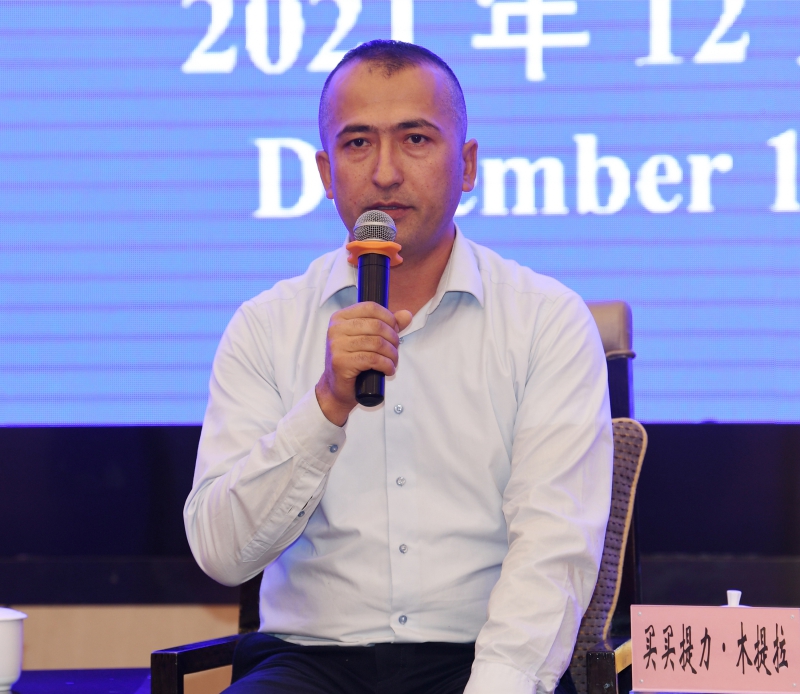
Photo taken on December 15, 2021 shows Maimaitili Mutila speaks at the special press conference of Xinjiang Uygur Autonomous Region on refuting the allegation of “forced labor”. Photo by Xinjiang Daily/ Zhou Peng
Maimaitili Mutila: Good Morning, everyone. I’m Maimaitili Mutila, a native of Artux City, Kizilsu Kirghiz Autonomous Prefecture and also the head of Xinjiang Su’antong Road Maintenance Company.
Ever since I was a little kid, I aspired to live in big cities to experience a different life. After graduating from Jiangxi Traditional Chinese Medicine University, I applied for a job in a textile foreign trade company in Shaoxing, Zhejiang, where I could make about 5,000 yuan a month. We signed labor contract with the company, stipulating the company to pay the five insurances and one found. Our rights and interests are protected by law. The company leaders and colleagues cared about us a lot, providing us free dormitory with all the needed electrical appliances. There is a halal canteen in the company, offering delicious food. I befriended lots of people from various places in the country. I often told them stories about Xinjiang, introducing the unique scenery of Xinjiang for them to visit. We played basketball or went swimming together on weekends. It was a great time working there.
Later, I went to work at a stone material factory as salary was higher in stone industry-8,000 yuan a month. At this company, I was deeply touched by local people’s “fight to win” spirit. I worked very hard at the company and accumulated working experience and the way to run business.
In November 2017, I went back to my hometown to start my own business-a stone material factory. Business at the factory is quite promising as annual income could reach over 2 million yuan. It also provides jobs for thirty local people. Each of them earns 3,500 yuan a month. In May 2021, I started a road maintenance company in Artux City. The main businesses are the repair and laying of asphalt roads. At present, the company has undertaken several projects, making me feel confident about the future development of the company.
Recently, western anti-China forces led by the U.S. spread rumors about Uygurs are being “forced labor”. I’m infuriated by their slanders. We have the freedom to go anywhere in the country, a true portrayal of our life. Many relatives and friends around me run business or work in Beijing, Shanghai, Guangzhou and other places. They have broadened their horizons, increased their knowledge and are living their much-anticipated life through hard work. Where does “forced labor” come from?
Elijan Anayat: Thank you, Maimaitili Mutila. Next, let’s welcome Wang Jintai, a farm technician from the Changji National Agricultural Science and Technology Park, to introduce relevant information.
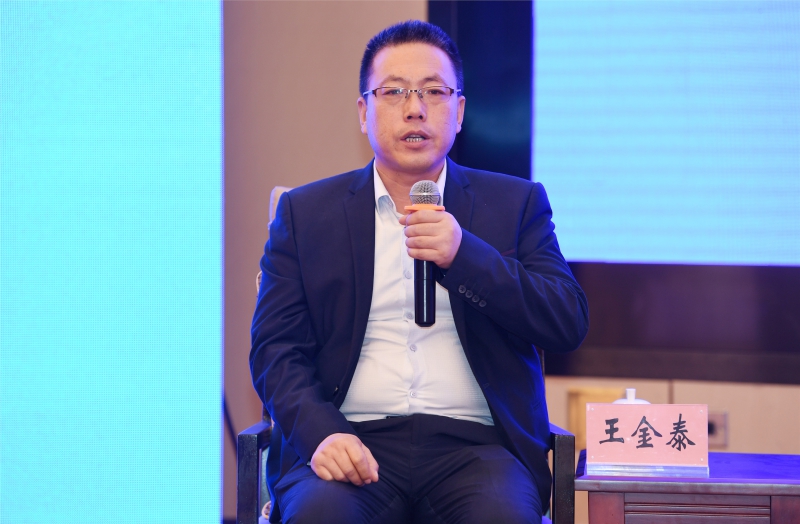
Photo taken on December 15, 2021 shows Wang Jintai speaks at the special press conference of Xinjiang Uygur Autonomous Region on refuting the allegation of “forced labor”. Photo by Xinjiang Daily/ Zhou Peng
Wang Jintai: Good morning, everyone. I’m Wang Jintai, a farm technician at the Changji National Agricultural Science and Technology Park. Agricultural production started in 1997 on the farm, with a total area of 11, 290 mu. Main crops are cotton, watermelon and grapes. There are currently 80 employees, 10 seeders, 6 drones and 6 mechanical cotton pickers.
Only four people are needed from the sowing in spring to the harvest in autumn for a land of 600 mu. A large cotton planter with Beidou navigation system would take about 4-5 days to complete the sowing in spring. When the picking time arrives, the harvest of the land of 600 mu will take only 13-16 hours.
The mechanization has reached a high level on our farm. At the beginning of 2000, we put the seeders in to use. At the end of 2010, cotton pickers were applied and in 2015, unmanned aerial vehicles started to make a difference. Machinery such as seeders, cotton pickers, UAVs, etc., are equipped with navigation equipment. A smart phone at distance can complete sowing, harvesting, fertilization, and spraying. Taking the unmanned aerial vehicle as an example. It is mainly used for daily field management, the plantation, topping, pest control of cotton. With the advancement of application technology, farming does not need much labor. And absolutely no need to “force” people to pick cottons. People of all ethnic groups can tell right from wrong. I want to tell those anti-China forces led by the U.S. who fabricated the fallacies of “forced labor” and “ genocide” in Xinjiang that your malicious goal will not realize.
Elijan Anayat: Thank you very much, Wang Jintai. Next, let’s welcome Qimanguli Keyimu, a worker from a textile factory at Gaochang District, Turpan City to introduce relevant information.
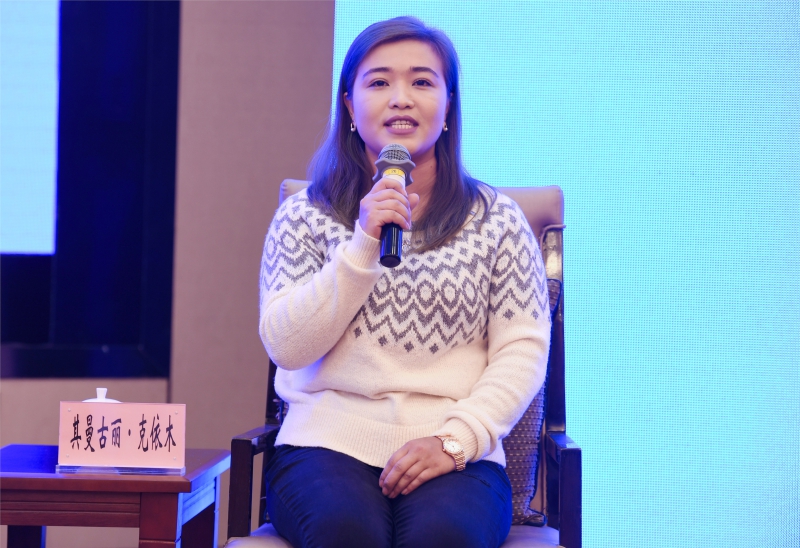
Photo taken on December 15, 2021 shows Qimanguli Keyimu speaks at the special press conference of Xinjiang Uygur Autonomous Region on refuting the allegation of “forced labor”. Photo by Xinjiang Daily/ Zhou Peng
Qimanguli Keyimu: Good morning. My name is Qimanguli Keyimu, a textile worker. My family are living a happy life because of my job and the cotton my father plants. A few days earlier, I heard many slanders about Xinjiang, claiming that we are “forced labor”, which is absurd. As a textile worker of ethnic minority, I must stand up and destroy these ridiculous remarks with my personal experiences.
My father is a cotton farmer. But the cotton field is not big enough for machines to do the pick. We hire cotton pickers every year. The pickers could make 300-400 yuan a day if they are fast enough, which means 9000-12000 yuan a month. They can make more than 30,000 yuan in just three months. The neighboring farmers would rush to our cotton field to pick cotton in autumn.
I work at a textile company. The workshops are full of operating machines, which make pure natural cotton into fine lines, yarns, and cloths. The job is stable, so is the salary. We have sound working environment and rotate shifts at the factory and don’t have worry about the salary of next month. This is the happy life that the new era brings us, and this is the good day we anticipated.
The so-called lie of “forced labor” could not be more ridiculous. Cotton farmers in Xinjiang including my father plant cotton according to their own will, so do the cotton pickers. There is only one reason for them to do so: they can make more money from planting and pick cottons. Why is it “forced labor” to make money with our hands and fight for a happy life? Those who are making lies and spreading rumors, how about coming to Xinjiang to have a look at the cotton fields and the textile factories? Your so-called “forced labor” is groundless smear!
Elijan Anayat: Thank you, Qimanguli Keyimu. Next, let’s welcome the Deputy Secretary of the Party Branch of Aqiadun Village, Yangtake Township, Maigaiti County, Kashgar Prefecture, Reziwangu Simayi to tell us her story.
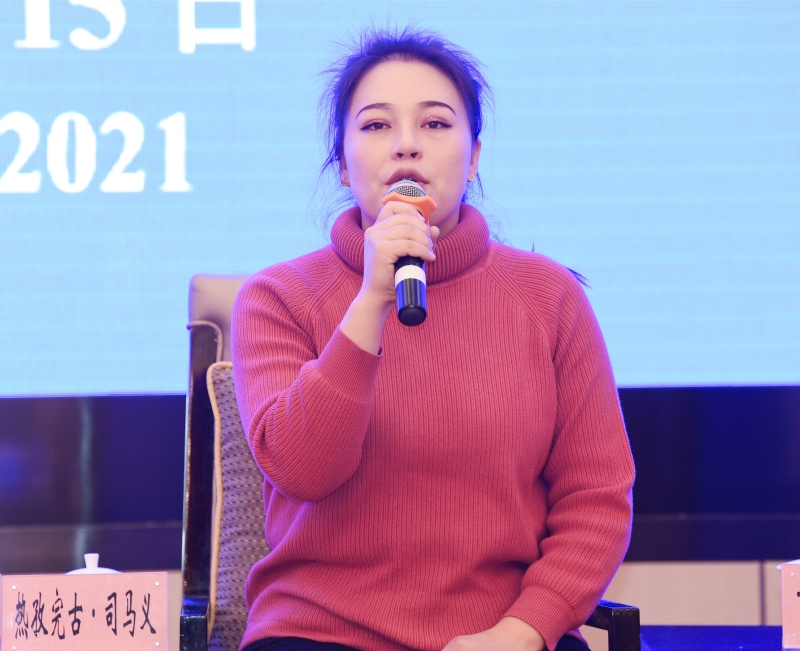
Photo taken on December 15, 2021 shows Reziwangu Simayi speaks at the special press conference of Xinjiang Uygur Autonomous Region on refuting the allegation of “forced labor”. Photo by Xinjiang Daily/ Zhou Peng
Reziwangu Simayi: Good morning, everyone. I’m Reziwangu Simayi, 27 years old, living at Aqiadun Village, Yangtake Township, Maigaiti County. I’m the Deputy Secretary of the Party Branch of Aqiadun Village. The main source income of my family is monthly salary and the income from planting vegetables.
My hometown is located at the edge of the Taklimakan Desert, where sees ravaging sandstorms all year round. The saline-alkali soil cannot produce high yield crop and high benefit. Agricultural income alone could barely support many villagers’ lives. About 500 surplus laborers in the village had trouble finding proper jobs.
At the beginning of 2018, I was elected by the villagers as deputy director of the village committee. The transfer of labors and mass work are the major two components of my job. I go to the villagers every day, publicizing the benefits of transferring employment from door to door. Many villagers couldn’t understand the benefits of going out for work and were unwilling to leave their hometown at the beginning. I played the working and daily life videos of migrant workers from Xinjiang to them and introduced them the salaries, living conditions and all the benefits of working at enterprises outside of Xinjiang. The time had come to May 2018, a fellow young man named Ku’erban Tulaike came to me and told me that he wanted to work outside of Xinjiang together with his wife. I was very excited hearing him say so, which meant my work was not in vain. I contacted with the office of labor export in the county immediately and drove them to the county that day.
On May 25, 2018, Ku’erban Tulaike and his wife took the train to Rizhao, Shandong. From June that year, the couple started working at a seafood processing factory. According to Ku’erban’s introduction, the working time is eight hours a day and the monthly salary is 5,000 yuan. The factory pays social insurance for the workers and provided couples’ dormitory for them. The off-duty time is completely at their disposal. On the Corban festival in 2019, the couple went back home for visit. They came to the village’s committee and told the villagers that “I have earned more than 80,000 yuan over the past year and will continue to do the job after the holiday. The transportation fees for home-visiting are reimbursed by the company. If anyone is interested in the job, you can go with me to have a try.” Hearing what he said, more villagers are going out for work these two years. And the financial burdens have been reduced a lot.
Nowadays, villagers are living a much better life in bright and spacious house. In the meantime, they are the beneficiaries of various preferential policies in employment, health care, education, etc. Their life is changed by the hard work. The Ku’erban family live in a cozy house and has a car to take them to wherever they want to go. There are many others just like Ku’erban who go out for work and live a happy life. I don’t see the need to “force” them to work.
I have never heard of nor seen “forced labor” in my life. Those who spread the rumors simply don’t want us to live a happy life and are jealous of our good days. I will never allow anyone to stigmatize my country and hometown.
Elijan Anayat: Thanks very much, Reziwangu Simayi. Next, let’s welcome Buqiguli Yasen, employee at the village’s factory of Zhanmin Township, Shufu County, Kashgar Prefecture to give us relevant information.

Photo taken on December 15, 2021 shows Buqiguli Yasen speaks at the special press conference of Xinjiang Uygur Autonomous Region on refuting the allegation of “forced labor”. Photo by Xinjiang Daily/ Zhou Peng
Buqiguli Yasen: Good morning, everyone. I’m Buqiguli Yasen, an extroverted girl from No. 2 village of Zhanmin Township, Shufu County. I now work at a factory based in the township.
I worked on farmland after graduation from senior high school and got married after a few years’ romantic relationship with my high school classmate. When we first got married, we had no other means of earning life except to be farmers. To take care of children, I became a stay-at home mom. Even if my husband got up early and worked till very late every day, the family did not live a well-off life. Seeing my husband’ s exhaustion everyday, I wanted to share my part of responsibility as a wife. I was thinking if I had a job, then I would reduce the economic burden of the family.
Later, I learned that a rural factory was built in the neighboring village. I thought it was a rare opportunity to be able to work nearby with a fair enough income and can take care of the family at the same time. I had my husband’s supported and went to apply for the job with confidence. Since I went to high school and my standard spoken and written Chinese language is good enough, I passed the interview successfully. It gave me a sense of pride to have changed from a housewife to a worker.
I have worked at the factory for three years and have grown from an ordinary worker to an managerial personnel of the factory, with a monthly salary of about CNY 3, 000. Through the joint efforts of my husband and I, we have renovated the old house, reconstructed the adobe Kang and kitchen, and bought new bed, sofa and electric vehicle with the money earned.
During the time in the factory, I have not only improved the living conditions at home, but also got my horizon broadened, technical skill enhanced. These are all attributed to the good policies of the government, helping me realize nearby employment and live a better life.
It is nearby employment that changed my fate and that of people around me. It can be said that it’s job that makes me realize the goal and meaning of life and turns my life even better. To my surprise, I heard that western anti-China forces led by the U.S. have been smearing that “forced labor” existing in Xinjiang. I’m living a perfectly happy life with my work and family both on the upward track. Is it “forced labor”? These people have no idea about what work means to life. You are not in the place to make judgement on the life of people in Xinjiang. Please mind your own businesses!
Elijan Anayat: Thanks very much, Buqiguli Yasen. Next, let’s welcome the Imam of the Minzhu North Road Mosque, Qinghe Township, Qinghe County, Altay(Prefecture), Tuohetawubai Xiayimu’erdan, to give us relevant information.
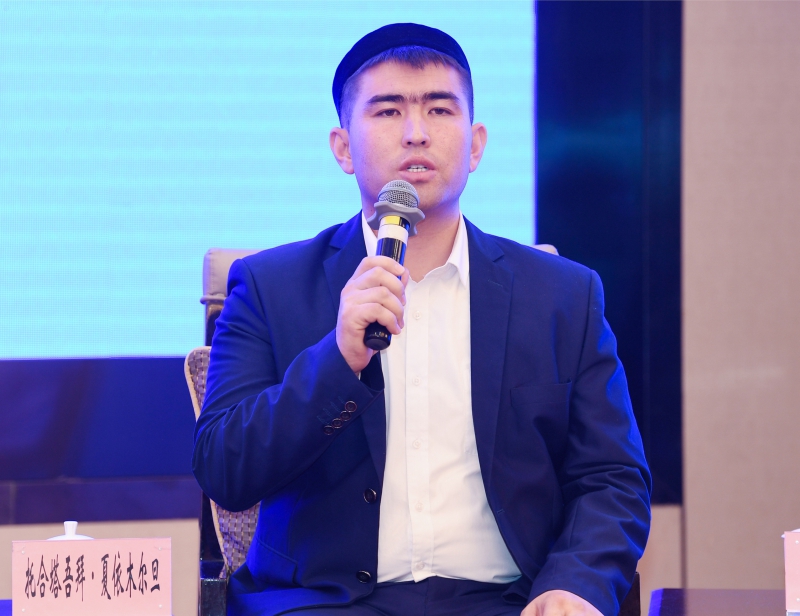
Photo taken on December 15, 2021 shows Tuohetawubai Xiayimu’erdan speaks at the special press conference of Xinjiang Uygur Autonomous Region on refuting the allegation of “forced labor”. Photo by Xinjiang Daily/ Zhou Peng
Tuohetawubai Xiayimu’erdan: Good morning. I’m Tuohetawubai Xiayimu’erdan, the Imam of the Mosque at Minzhu North Road, Qinghe Township, Qinghe County, Altay Prefecture. The recent slanders made by western anti-China forces on the so-called “forced labor” issue are lies with ulterior motives in essence.
Every adult understands the simple truth that working is glorious and only through hard work can our lives be changed. To receive without paying efforts and seek after comfort and abominate labor are despised by common people. Farmers increase income through farming, herders through grazing and ordinary laborers through their own ways of work. Working is not only our right, but also obligation. It is also a necessity for us to improve production and living conditions and pursue a better life.
As a religious personnel, I make money through work in addition to my work to provide service for religious believers. I have a family of six, my parents, my wife working at Arele Township in charge of publicity, two sons, one 4 years old, the other 2. We have an arable land of 36 mu, and have signed leasing contract with others for 600 yuan per mu. We also have a pasture of 20 mu, raising 20 cattle, 12 horses and 30 sheep. The livestock have been transferred from the summer pasture to the shed for more than a month. I feed them grass twice a day in morning and evening. Through hard work, I bought an apartment of 150 square meters in the county and a car worth 100,000 yuan last year and a minivan of 60,000 yuan this year. My family are living a wonderful life together. I can say it with pride that the happy life we are enjoying are benefited from the preferential policies of the Party and the country and created from our own hard toil.
My own family is the epitome of hundreds of thousands other happy families in Xinjiang. Those lie-makers, you can have a visit to my hometown. Are the happy life we are having and the “forced labor” in your words the same thing? I’d like to urge those anti- China forces in the U.S. and the west to stop your show. Your devious motive can not deter our strive for a better life. You will only get backlash from doing so!
Elijan Anayat: Thanks very much, Tuohetawubai Xiayimu’erdan. Next, let’s welcome Ding Jie, the Vice President of Fellowship Association for the New Social Stratum and General Manager of Xinjiang Hualian Construction Investment Group Ltd. Company to introduce relevant information.
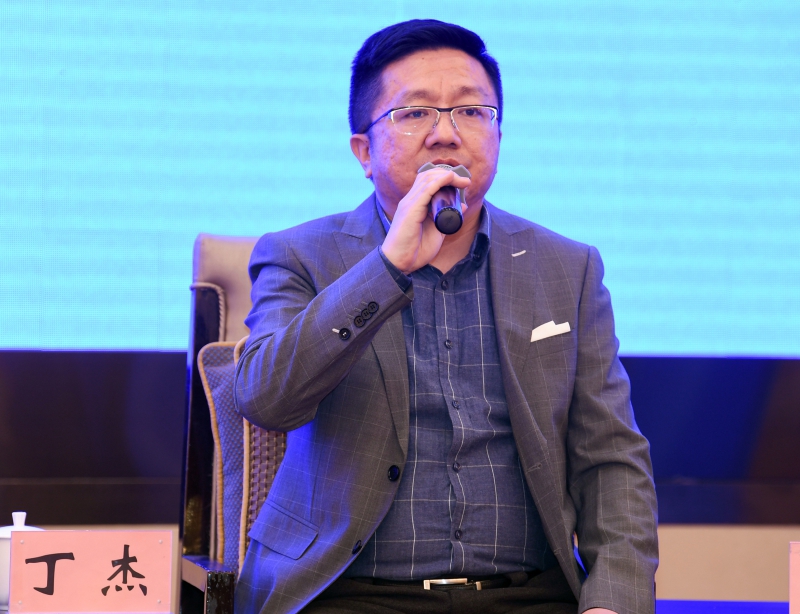
Photo taken on December 15, 2021 shows Ding Jie speaks at the special press conference of Xinjiang Uygur Autonomous Region on refuting the allegation of “forced labor”. Photo by Xinjiang Daily/ Zhou Peng
Ding Jie: Good morning, everyone. I’m Ding Jie, General Manager of Xinjiang Hualian Construction Investment Group Ltd. Company.
Three years ago, our company obtained a piece of land in the southern suburbs of Urumqi County through bidding and auction organized by government. We planed to quarry sand and stone under the standard of green mine. Since then, I forged a profound friendship with Sidike and Mairemu, a couple from Huoyila Village, Setili Township, Yengisar County, Kashgar Prefecture.
At the beginning, they worked as security guard and cleaning maid at the mine. Through their efforts, Sidike became a repairman at the production department, and Mairemu works in our canteen, with an increase of salary. The couple have a plan to buy an apartment in Urumqi to settle here. The transfer of employment has brought earth-shaking changes to their lives. They money they can make has grown several times.
When I’m not that busy, I would make phone calls with them to learn about their work and life and ask if they have any difficulties. On Spring festival and Corban festival, I would go visit them and have dinner together. They often say to me that they couldn’t get it why western anti-China forces are so evil that they make absurd lies such as “forced labor” to stigmatize our country and hometown with things do not exist. The people who made the lies have never visited Xinjiang. How could they express opinions “on our behalf”? How could they “feel” what we “feel”.
I urge all the western anti-China forces led by the U.S. to mind your own businesses. More importantly, mind what you say. Stop spreading lies. Your despicable actions of calling white black will not deter the development and prosperity in Xinjiang.
Elijan Anayat: Thanks very much, Ding Jie. In history, the United States of America practiced slavery and traded slaves and conducted genocide against indigenous Indians. The U.S. is still the worse-hit area of human trafficking and forced labor till today. In Xinjiang, there are many other cases of people of all ethnic groups live happily and prosperously through diligence and intelligence. Next, please watch a video.
Elijan Anayat: The so-called “forced labor” in Xinjiang is fabricated through lies. The real purpose of the repeated hype of the so-called “forced labor” issue in Xinjiang by western anti-China forces led by the U.S. is to disturb the stability and prosperity in Xinjiang, to deprive the people in Xinjiang of the right to survival, employment and development. All these have revealed the devious goals of the U.S. to curb China through Xinjiang. What the U.S. should do is to reflect on its own deeds on human rights issue and stop wasting energy and time on the so-called “forced labor”issue to stigmatize China and put an end to your political manipulation.
Today’s press conference concludes here. Thanks very much, all the friends from media and all the speakers for today. See you!








